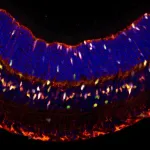Dr. Christopher Kramer is new American College of Cardiology President
Kramer begins a one-year term as head of the premiere global cardiovascular organization
2025-03-31
(Press-News.org) Christopher M. Kramer, MD, FACC, today assumed the role of president of the American College of Cardiology, an almost 60,000-member global cardiovascular organization working to transform cardiovascular care and improve heart health for all.
“I see significant challenges and opportunities for the field of cardiology in the coming years, including workforce issues, health equity, diversity and inclusion, and AI-driven solutions, that need to be addressed to achieve ACC’s mission of transforming cardiovascular care for all,” Kramer said. “I am looking forward to using my term as president to help ACC be a leader on these issues, while getting to know more of our inspiring, diverse membership and hearing their concerns and achievements across the U.S. and throughout the world.”
Kramer, whose interest in cardiology began during a summer scholarship program in high school, received his medical degree from the University of California, San Francisco School of Medicine. He completed his residency and chief residency in internal medicine and fellowship in cardiology at the Hospital of the University of Pennsylvania in Philadelphia. His first faculty appointment was at Allegheny General Hospital in Pittsburgh, then MCP/Hahnemann University School of Medicine in Philadelphia, where he directed the cardiology fellowship before moving in 1999 to the University of Virginia School of Medicine in Charlottesville, Virginia, where he became chief of the Cardiovascular Division in 2019.
Kramer's principal research interest has been the application of cardiovascular magnetic resonance (CMR) imaging to the cardiovascular system in translational and clinical studies. In recognition of his work, he received the Gold Medal from the Society for Cardiovascular Magnetic Resonance in 2015, reinforcing the impact of his contributions to the field of CMR over his career.
His dedication to the College over a 35-year membership is reflected in his various leadership roles, including vice president, treasurer and chair of ACC's Imaging Council. Kramer was also an associate editor for imaging at JACC and executive editor of JACC: Cardiovascular Imaging. In 2021, Kramer was named a Distinguished Mentor by the ACC, which he has described as “an incredible honor.”
Kramer officially assumes the presidency during the Convocation Ceremony at ACC’s Annual Scientific Session, taking place March 29 – 31, 2025 in Chicago.
Other new officers for 2025-26 are Vice President Roxana Mehran, MD, FACC; Board of Trustees Members Samuel O. Jones, IV, MD, MPH, FACC; and Geoffrey A. Rose, MD, FACC; Board of Governors Chair David E. Winchester, MD, MS, FACC; and Board of Governors Chair-elect Renuka Jain, MD, FACC.
The American College of Cardiology (ACC) is the global leader in transforming cardiovascular care and improving heart health for all. As the preeminent source of professional medical education for the entire cardiovascular care team since 1949, ACC credentials cardiovascular professionals in over 140 countries who meet stringent qualifications and leads in the formation of health policy, standards and guidelines. Through its world-renowned family of JACC Journals, NCDR registries, ACC Accreditation Services, global network of Member Sections, CardioSmart patient resources and more, the College is committed to ensuring a world where science, knowledge and innovation optimize patient care and outcomes. Learn more at www.ACC.org.
###
END
[Attachments] See images for this press release:

ELSE PRESS RELEASES FROM THIS DATE:
2025-03-31
Effective today, David E. Winchester, MD, MS, FACC, will serve as chair of the American College of Cardiology Board of Governors (BOG) and secretary of the Board of Trustees. His term will run one year from 2025-2026.
Winchester will lead governors from chapters representing all 50 states, the District of Columbia, Puerto Rico, Canada, Mexico and representatives from the U.S. health services. The BOG serves as the grassroots governing body of the ACC, a leading cardiovascular organization representing over 56,000 cardiovascular care team members around the world.
“Being Chair of the Board ...
2025-03-31
Embargoed for release until 5:00 p.m. ET on Monday 31 March 2025
Follow @Annalsofim on X, Facebook, Instagram, threads, and Linkedin
Below please find summaries of new articles that will be published in the next issue of Annals of Internal Medicine. The summaries are not intended to substitute for the full articles as a source of information. This information is under strict embargo and by taking it into possession, media representatives are committing to the terms of the embargo not only on their own behalf, but ...
2025-03-31
TUCSON, Arizona — A University of Arizona Health Sciences-led study found that patients are more likely to get colonoscopies following abnormal stool test results if patient navigators assist them through the process.
The paper, published in the Annals of Internal Medicine, showed that 55% of patients who were assigned to a patient navigator received follow-up colonoscopies within a year compared with 42.5% of patients who received usual care without a navigator.
“It is important for patients with abnormal stool test results to get a colonoscopy as soon as possible to prevent an increased risk of colorectal cancer and later-stage cancer detection,” ...
2025-03-31
Contact: Bess Connolly, 203-432-1324 or elizabeth.connolly@yale.edu
New Haven, Conn. — A Yale-led study warns that global climate change may have a devastating effect on butterflies, turning their species-rich, mountain habitats from refuges into traps.
Think of it as the “butterfly effect” — the idea that something as small as the flapping of a butterfly’s wings can eventually lead to a major event such as a hurricane — in reverse.
The new study, published in the journal Nature Ecology and Evolution, ...
2025-03-31
Aya Goldshtein, Omer Mazar, and Yossi Yovel have spent many evenings standing outside bat caves. Even so, seeing thousands of bats erupting out of a cave and flapping into the night, sometimes in densities so high that they appear liquid, astounds the scientists every time. But until recently, the bat biologists were even more baffled by what they didn’t see. “The bats don’t run into each other,” says Goldshtein from the Max Planck Institute of Animal Behavior, “even in colonies of ...
2025-03-31
The same genes could hold the key to regenerating cells in the ear and eye, according to a new mouse study from the USC Stem Cell laboratory of Ksenia Gnedeva, PhD, published in the Proceedings of the National Academy of Sciences (PNAS).
“The proliferation of progenitor cells in response to injury is a crucial step in the regeneration of sensory receptors, but this process is blocked in the mammalian inner ear and retina. By understanding the genes that enforce this block, we can advance efforts to restore hearing and vision in patients,” said Gnedeva, an assistant professor in the USC Tina and Rick Caruso Department of Otolaryngology ...
2025-03-31
A new study published in Proceedings of the National Academy of Sciences (PNAS) has turned traditional thinking on its head by highlighting the role of human interactions during the shift from hunting and gathering to farming - one of the biggest changes in human history - rather than earlier ideas that focused on environmental factors.
The transition from a hunter-gatherer foraging lifestyle, which humanity had followed for hundreds of thousands of years, to a settled farming one about 12,000 years ago has been widely discussed in popular books like Sapiens: A Brief History of Humankind by Yuval Noah Harari.
Researchers from the University of Bath, the Max Planck Institute ...
2025-03-31
International scientists have uncovered the oldest known phosphatic stromatoporoid sponge, dating back approximately 480 million years to the Early Ordovician, in South China.
Stromatoporoid sponges were key reef builders during the Palaeozoic era, playing a crucial role in constructing biological frameworks—similar to the role of modern corals. They were especially important during the middle Paleozoic era (from the late Middle Ordovician to Devonian), a time marked by a major transition from microbial-dominated to skeletal-dominated reef ecosystems. Previously, stromatoporoid ...
2025-03-31
New York, NY [March 31, 2025] — Brian Brown, PhD, Director of the Icahn Genomics Institute at the Icahn School of Medicine at Mount Sinai, has been elected to the College of Fellows of the American Institute for Medical and Biological Engineering (AIMBE). He was honored for his seminal work in gene therapy and functional genomics, which has helped transform the fields and contributed to key advancements in medicine and biotechnology.
Election to the AIMBE College of Fellows is one of the highest professional distinctions in the field. It recognizes the ...
2025-03-31
Mental health care can be difficult to access in the U.S. Insurance coverage is spotty and there aren’t enough mental health professionals to cover the nation’s need, leading to long waits and costly care.
Enter artificial intelligence (AI).
AI mental health apps, ranging from mood trackers to chatbots that mimic human therapists, are proliferating on the market. While they may offer a cheap and accessible way to fill the gaps in our system, there are ethical concerns about overreliance on ...
LAST 30 PRESS RELEASES:
[Press-News.org] Dr. Christopher Kramer is new American College of Cardiology President
Kramer begins a one-year term as head of the premiere global cardiovascular organization




